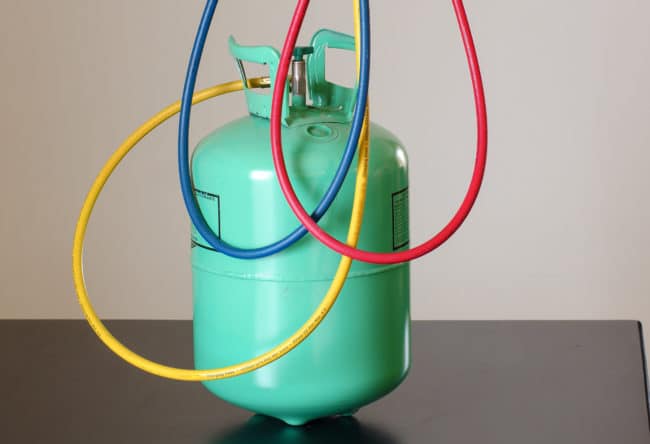If you haven’t heard about the R22 Phase Out, then this post is for you. This is a very important topic, especially for those who own heating and air units that use R22 refrigerant, typically referred to as Freon. R22 Freon is no longer available, and was actually made illegal, on January 1, 2020. For this reason, there are important things homeowners and business owners need to know concerning this matter.
We’re going to go over the details of the R22 phase out, why it happened, and what it means for you (and me).
Please note that the newer recommended refrigerant mentioned in this post (R410a) is also being phased out starting on January 1, 2023.
What is the R22 Phase Out?
Over 30 years ago the Montreal Protocol was put into affect to cease the production of ozone layer depleting substances. It’s a international agreement to rid the Earth of these substances. It was determined that R22 refrigerant was one of these substances. They stated that Freon was contributing to the depletion of our ozone layer. Chlorine is believed to be the main compound in the refrigerant that causes the most harm to the ozone layer.
The phase out of R22 began in 2014-2015 and has progressed ever since. It fully culminated on January 1, 2020. According to the EPA, in 2019 the production of R22 dropped by 55% from 2018. On January 1, 2020 it ceased completely. It’s no longer manufactured or imported.
Does This Affect You?
If your air conditioner uses R22 refrigerant, then this affects you. You can find out what kind of refrigerant your system uses by checking the manufacturer’s data plate. The data plate will typically be located on the condenser unit (outdoor unit) or the air handler (indoor unit). You also might find a specific sticker that lists the refrigerant type in larger letters and numbers. You should find either R22 or the other alternative, R410A listed on the unit. They could also be labeled as HCFC-22 or HFC-410A.
If you are having trouble finding the refrigerant type, knowing the manufacturing date can also help. If the unit was manufactured before 1996, then it definitely uses R22. If it was manufactured between 1996 and 2009, it could use either of the refrigerants. If it was manufactured in 2010 or later, then it uses R410A and you don’t have to worry about the R22 phase out. But, please note: the current accepted R410a refrigerant is also being phased out starting on January 1, 2023 and will no longer be used in new units. So, the tips in this post are applicable for people that have units that use R410a refrigerant as well.
Something that you need to know: Many people think that “Freon” refers to any and all refrigerant that is used, especially with air conditioning systems. But, this is not the case. Freon is actually only related to R22. Because R22 was widely used for such a long time as the refrigerant, Freon and refrigerant became interchangeable. So, there are multiple types of refrigerant out there, but R22 is the only Freon.
How Does This Affect You?
First of all, when something valuable is reduced in production, the price of that product will increase. It is no different with R22 Freon. The price for this refrigerant has gone up each of the last 4 years and will only keep going up. This translates to higher service costs when R22 refrigerant is used.
Now that R22 is completely phased out, it is very hard to find it available. I’m not saying it’s impossible, but if you do find it, it will probably be extremely expensive and not cost-effective at all. The only available R22 will be that which was previously produced or that has been recycled.

So, What is the R22 Refrigerant Replacement?
R22 Freon was replaced by a more environmentally safe refrigerant, R410a Puron. R410A isn’t exactly new, as it was created in 1991 by Honeywell. Unit’s that are R410A compatible started to be manufactured in 1996. As stated before, the R22 phase out has been going on for years, but it is now finally completed.
At this point, we no longer recommend purchasing a system that uses R410a refrigerant since it is also being phased out. We recommend purchasing a system that is made to use the newer refrigerant (R454B) being produced.
R22 Phase Out Options
If your cooling system uses R22, we recommend upgrading to an air conditioner that uses the new accepted refrigerants, such as R454B. If your system uses R22, then it’s likely fairly old anyways and replacing the ac unit will be cost-effective in more ways than one. If your unit uses R410a, we recommend considering replacing it since the R410a refrigerant will be phased out in 2023.
You can always ride out your current R22 system for however long it lasts. The only issue with this is that if the system has an issue (in 2020 and after) and R22 refrigerant is needed, it’s not guaranteed that it will be able to be supplied. This would likely result in having to get a new replacement unit in a hurry.
Have you had to take any action concerning the R22 phase out? Does your current system use R22 refrigerant?
Comment below! We’d love to hear from you.


stuggling with this R22 phase out. we apparently have A/C with an electric furnace piggybacking the same air handler. i’ve read in some places that the R22 units can be converted but, some thing like oil has to be replaces as well. other A/C contractors have started that if the outside unit is updated that the airhandler/inside part of the unit will need to be replaced as well. do you have any additional input? thanks, bob
Hey Bob! Well yes you are correct. If the outside condenser unit is updated to be compatible with the newer R410A refrigerant, then you’d also have to update or replace the indoor evaporator coil unit because the refrigerant flows through that section of the system as well. I hope this helps you!